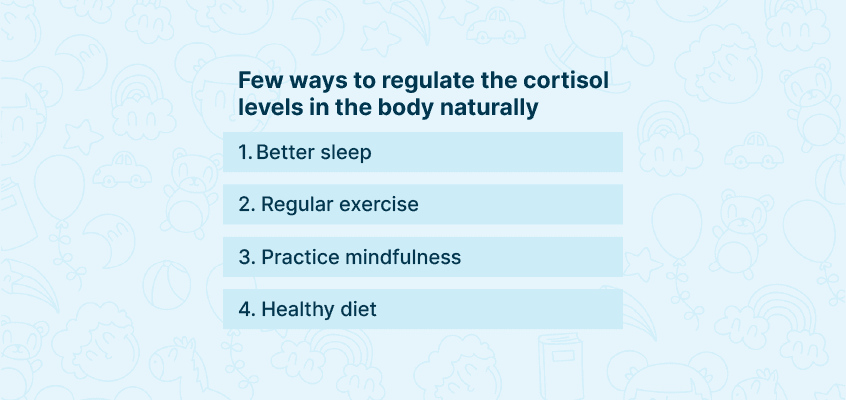Introduction
Cortisol is a steroid hormone that belongs to the class of glucocorticoid hormones. It is produced in the adrenal glands and regulates the body’s metabolism. This stress hormone modifies the immune system response and helps people cope with stressful conditions. However, Long-term activation of cortisol in the body can cause serious health problems, such as high blood pressure and diabetes.
Our Wellness Programs
How does cortisol induce diabetes?
Diabetes is a serious health condition that occurs due to high blood sugar levels in the body. The cortisol or stress hormone helps regulate blood sugar levels and increase energy levels. Cortisol and epinephrine maintain the biochemical and hormonal balances of the body. The hormone floods the body with excess glucose to raise energy levels temporarily. During stress, the cortisol hormone taps the glucose in the protein stores with the help of gluconeogenesis in the liver, which inhibits insulin production in the body and prevents glucose storage. However, when the cortisol level in the body rises, the body maintains its general-insulin resistant state. Consistent glucose production can lead to high sugar levels and induce diabetes. High glucose content in the body increases the risk of type-2 diabetes.

Looking for services related to this subject? Get in touch with these experts today!!
Experts

Banani Das Dhar

India
Wellness Expert
Experience: 7 years

Devika Gupta

India
Wellness Expert
Experience: 4 years

Trupti Rakesh valotia

India
Wellness Expert
Experience: 3 years
How does cortisol induce hypertension?
Hypertension is a health condition in which the blood pressure measures consistently above normal levels. The force of the blood against the arteries is very high.
Cortisol hormone plays a significant role in human hypertension. The leading cause of cortisol-induced hypertension is the retention of sodium and volume expansion in the body.
Though the process through which cortisol steroid hormone causes an increase in blood pressure is under research, studies claim that hypertension induced by cortisol hormone occurs due to reduced activity of the nitric oxide depressor system that raises ET[10] levels in the body.
According to researchers, excess cortisol in the body can cause other forms of hypertension, such as apparent mineralocorticoid and liquorice abuse. High cortisol hormone can increase the serum concentration of hormones produced by the kidney and cause inflammation in the body. Besides, hypertension may also cause chronic renal failure or hypertension generated due to low birth rates.
Diabetes and hypertension are a result of elevated cortisol levels.
The cortisol hormone is essential for maintaining blood flow in the body. However, high cortisol content can increase blood sugar levels and significantly cause hypertension. Though the causative factor is yet unknown, increased cortisol levels for diabetes and hypertension raise the glucose content in the body. Cortisol hormone releases insulin and reduces GLP-1 production, thereby regulating the body’s insulin levels.
Besides, improper balance of cortisol hormone in the body over time causes Cushing Syndrome. It can also occur due to the consumption of oral corticosteroid medication for an extended period. The common symptoms of the syndrome include a rounded face, fatty hump between the shoulders, fragile skin that can bruise easily and stretch marks on the skin. Further, Cushing syndrome can also lead to loss of bone, high blood pressure and type-2 diabetes.
How to control cortisol level
The brain triggers the cortisol hormone during stress. Short-term cortisol levels may be beneficial to the body. However, consistent secretion of cortisol hurts health. To control the cortisol levels in the body, a person needs to find out solutions to reduce stress. Here are a few ways to regulate the cortisol levels in the body naturally:
1. Better sleep: Getting the right amount of sleep is essential for a healthy mind and body. Major sleeping problems such as insomnia obstructive sleep apnea result from high cortisol levels.
2. Regular exercise: Practicing any form of exercise helps regulate cortisol levels regularly. An intense workout increases cortisol levels which, however, decreases after a while. Exercising also reduces stress and improves the quality of sleep.
3. Practice mindfulness: Mindful activities like deep breathing and meditation enable one to connect the mind with the body, helping reduce stress and cortisol hormone levels.
4. Healthy diet: Take a nutrition-rich diet. Avoid foods with high sugar content, refined products and saturated fat. These foods shoot up the cortisol levels in the body and affect your health.
How to avoid diabetes and hypertension-tips for reducing stress
Stress is the primary cause of any health problem. To prevent diabetes and hypertension induced by stress, one should find solutions to overcome stress. The stressed individual having diabetes often has fluctuating blood sugar levels. Here are a few tips to reduce stress and avoid diabetes and hypertension:
1. Educate yourself: Deeply research your health condition. Learn about the causes of the disease and how to cope with it, which will help you deal with the problem better and effectively. Find out the foods which are beneficial for your health. You can also join diabetes or hypertension support groups to get and share your experiences and challenges regarding the disease.
2. Practice mindfulness and meditation: The benefits of yoga and meditation are scientifically proven to reduce stress. Regular yoga and meditation reduce stress and regulate the blood sugar levels in the body.
3. Relax: Find time for yourself. You can spend time with nature, read a book, or participate in fun activities with children. All these measures will help you relieve stress and relax your mind. Chronic Condition
Conclusion
When secreted for a short time from the adrenal glands, the cortisol hormone benefits the body. It regulates metabolism, controls blood sugar levels and also reduces inflammation. Cortisol plays a vital role in memory formation too. However, excess cortisol can cause significant health problems like diabetes and hypertension. Therefore, a balance of cortisol hormone in the body is required.














